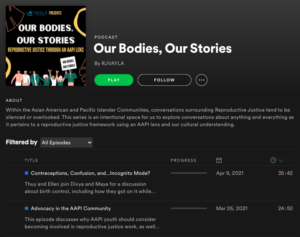
Starting a Podcast with VAYLA by Maya Jammulapati
This semester I was a reproductive justice intern at VAYLA New Orleans. Our primary focus was creating a podcast geared towards high school and college students about topics surrounding reproductive justice through an AAPI lens. Throughout the process, we have learned how to host a podcast, use a program that links all the platforms we use for distribution, edit everything, and not sound terribly awkward when speaking into a microphone.
While we created this podcast with the intention of building a mentorship resource for our audience, it helped form a storytelling space within our organization where I felt as though I learned about shared experiences, forms of fetishization, and cultural barriers preventing access to healthcare. Our first podcast simply detailed the framework of reproductive justice. From there, we talked about Asian stereotyping, giving consent, contraception, access to contraception, and how to get involved with reproductive justice advocacy as a student. When interviewing members in and outside of our organization, I was able to learn about the reasons they got involved in RJ work. Many times, it was because they experienced a lack of exposure or were formerly uncomfortable talking about topics surrounding sex. When recounting memories during the interview section of our podcast, I realized how many stories we shared about the typical “sex talk” or trying to broach the subject of dating with our parents. I felt a strong urge to recreate the same sense of comfort I experienced in this space with everyone who was in a similar position I was when growing up.
In middle and high school, I had just accepted the fact that discussing sex and relationships with relatives would always be counterproductive. However, I can now begin to see the lasting impact my former exposure and education have had on me. The work I am doing with VAYLA has taught me that we cannot accept the hindering cultural taboos associated with educating youth about reproduction. They need a comprehensive exposure to sex education, at an age-appropriate level, that accounts for the cultural awkwardness they may feel. The gender roles, which I have found to be emphasized in Asian household expectations need to be looked at differently. This overarching binary needs to be viewed as an option rather than the only option. This way we do not marginalize anyone who does not subscribe to this increasingly narrow viewpoint. Only then, can we expect kids to grow up respecting their autonomy, boundaries, and desires.
The podcast is slowly taking off and garnering views in several states and countries. I am excited to see how it impacts individuals or if we will get any more feedback from our audience. Until then, hopefully, we can continue calling out people who perpetuate harmful stereotypes and educating as many folks as possible.
